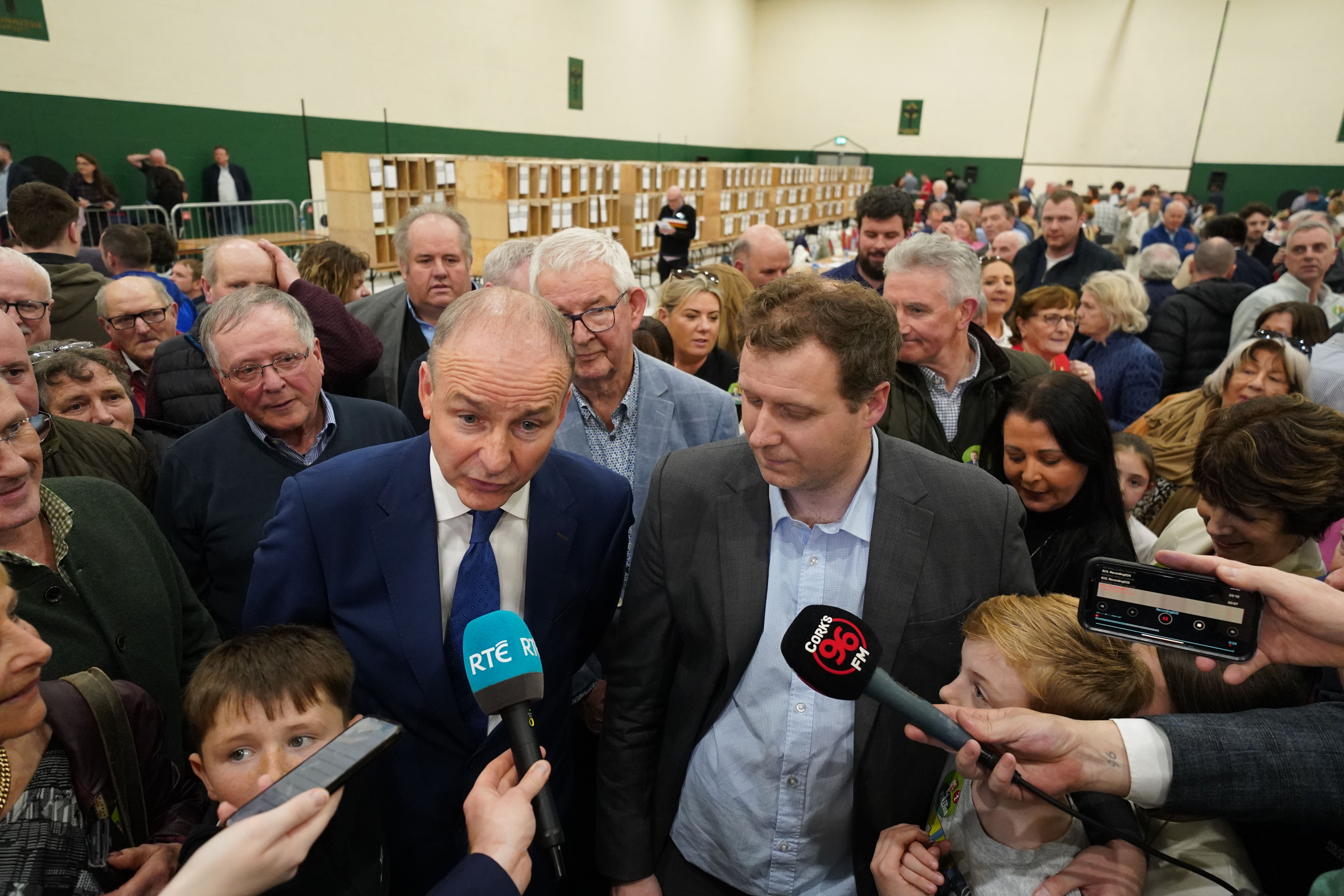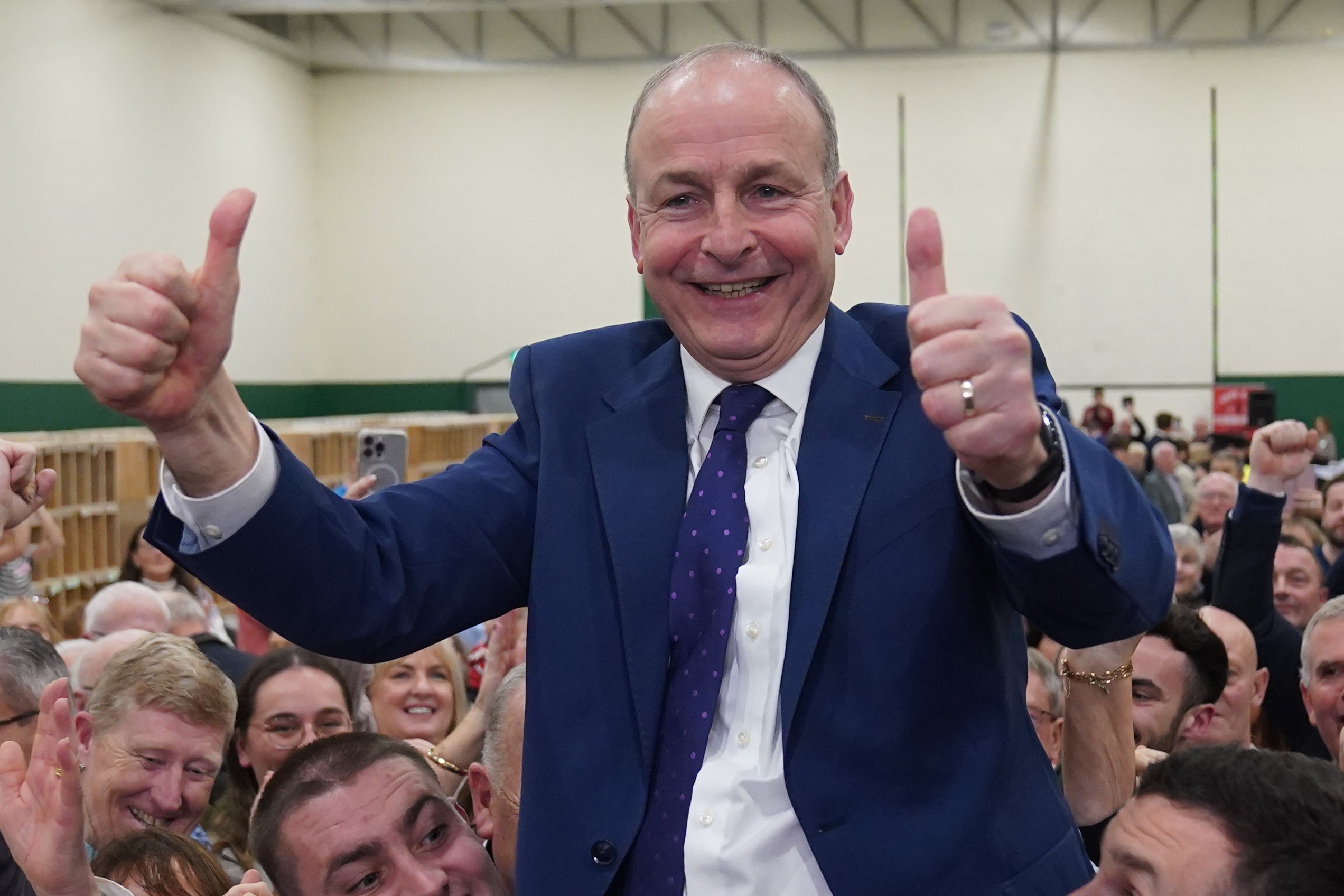Fianna Fail leader hails a ‘good day’ for party with two-thirds of seats declared in Irish general election
Fianna Fail is on course to be Ireland’s largest party after the general election

Your support helps us to tell the story
From reproductive rights to climate change to Big Tech, The Independent is on the ground when the story is developing. Whether it's investigating the financials of Elon Musk's pro-Trump PAC or producing our latest documentary, 'The A Word', which shines a light on the American women fighting for reproductive rights, we know how important it is to parse out the facts from the messaging.
At such a critical moment in US history, we need reporters on the ground. Your donation allows us to keep sending journalists to speak to both sides of the story.
The Independent is trusted by Americans across the entire political spectrum. And unlike many other quality news outlets, we choose not to lock Americans out of our reporting and analysis with paywalls. We believe quality journalism should be available to everyone, paid for by those who can afford it.
Your support makes all the difference.Fianna Fail’s leader has hailed his party’s general election performance with two-thirds of seats in the Irish parliament so far filled.
With Micheal Martin’s party on course to secure the most seats in the Dail parliament, speculation is intensifying around the potential make-up of the next coalition in Dublin.
After two days of counting following Friday’s poll, and with 128 of the 174 seats filled by Sunday evening, the return of an administration involving Fianna Fail and Fine Gael now looks a much more likely prospect than any government including the long-time main opposition party, Sinn Fein.
The two centre-right parties that have dominated Irish politics for a century, and who shared power in the last coalition, both ruled out governing with Sinn Fein before the election, so it seems unlikely that either would countenance that option if they could form a workable coalition together.
Speaking to reporters in Cork on Sunday night, Mr Martin said it had been a “good day for Fianna Fail”.

Asked about the formation of of a government, he said: “We’ll let the dust settle and savour the moment. We’ll then be in a position over the next couple of days to assess the landscape, devise our strategies.”
The other main story of the election is the near wipeout of the Green Party, which was the junior partner in the outgoing coalition.
The party lost 11 of its 12 TDs, including Media minister Catherine Martin, with leader Roderic O’Gorman clinging on to remain its sole representative in the Dail.
If Fianna Fail emerges as the largest party, Mr Martin would move to begin what could be a protracted negotiation on a programme for government with would-be coalition partners.
Fianna Fail secured the most first preference votes in the proportional representation contest, taking 21.9% to Fine Gael’s 20.8%. Sinn Fein came in third on 19%.
While Sinn Fein’s vote share represented a marked improvement on its disappointing showing in June’s local elections in Ireland, it is still significantly down on the 24.5% poll-topping share it secured in the 2020 general election.
While giving a good gauge of the parties’ expected returns, first preference shares do not necessarily correlate to seats won, with those depending on the complex and often unpredictable way transfers are allocated.
Fianna Fail nevertheless appears on track to significantly increase its seat lead over Fine Gael compared with the last election when the parties were much closer.
The outcome in 2020 saw the two parties enter a coalition on the basis that the holder of the Irish premier position would be exchanged midway through the term.
Mr Martin took the role for the first half of the mandate, with Leo Varadkar taking over in December 2022. Current Fine Gael leader Simon Harris succeeded Mr Varadkar as taoiseach when he resigned from the role earlier this year.
Fine Gael minister Paschal Donohoe said he would be making the case for Mr Harris to have another opportunity to serve as taoiseach.
“I believe he has done extraordinary work during the campaign and in particular in the final days of the campaign he made the decisive difference to our support,” he told reporters in Dublin.
“In seven months as taoiseach (Mr Harris) has shown me, and I think shown many, he has what it takes to be taoiseach again and I for one strongly believe that case continues to be there for him having the opportunity to serve as taoiseach.”
Mr Martin said there was “very little point” in discussing government formation until seats are finalised.
Asked if there was trust between Fianna Fail and Fine Gael, he said: “I think there’s capacity to get on.”
Speaking on Saturday night, Mr Harris dismissed talk of a Sinn Fein surge and said he was “cautiously optimistic” about where his party will stand after all votes are counted.
If Fianna Fail and Fine Gael return to power, they could need one of the Dail’s smaller parties to reach the required 88 seats to form a majority.
Another option may see the two parties seek the support of independent TDs.
The Social Democrats and the Irish Labour Party, which both had a good election, appear the most realistic junior partners.